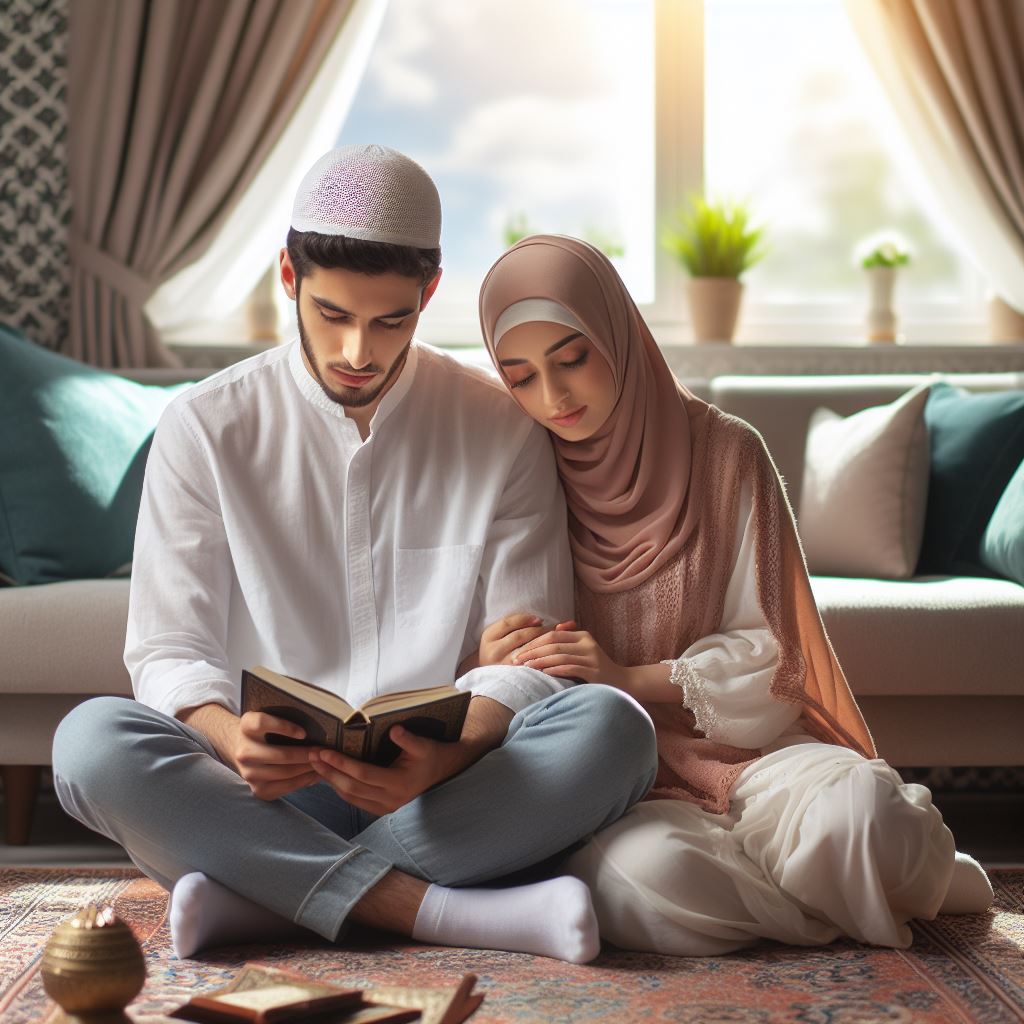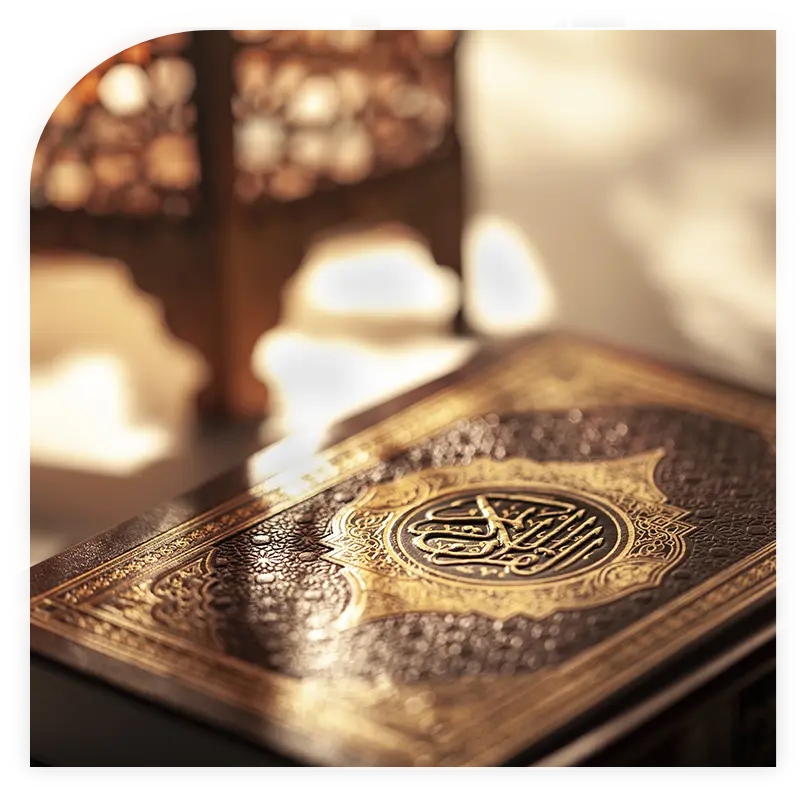Marriage in Islam transcends the mere legalities of a contract; it is a sacred union designed to cultivate love, compassion, and mutual respect between partners. Like any meaningful journey, married life comes with its share of ups and downs. Partners may occasionally develop misunderstandings and harbor negative feelings due to the inevitable challenges of life. In these turbulent moments, Dhikr — the cherished practice of remembering Allah through heartfelt phrases and supplications — serves as a lifeline.
By regularly engaging in Dhikr, couples can fortify their resilience against life’s storms, keep their hearts aligned with divine wisdom, and maintain a sense of emotional and spiritual buoyancy. Let’s explore five essential Dhikr sayings that can transform everyday marital interactions into acts of divine worship, thus strengthening the foundations of a Muslim marriage and nurturing a holistic sense of well-being within the household.
Dhikr for Married Couples

The Significance of Dhikr in Strengthening Marriages
Dhikr involves reciting phrases that glorify Allah and reinforce the presence of divine guidance in one’s life. For married couples, these spiritual practices can serve as a foundation for building a resilient and loving relationship that withstands the trials and tribulations of life.
Top 5 Dhikr for Enhancing Marital Bliss
“SubhanAllahi wa bihamdihi” (سبحان الله وبحمده)
Benefits and Effects on Marriage: This Dhikr, which translates to “Glory be to Allah and His is the praise,” helps couples cultivate a sense of awe and reverence for the beauty and perfection of Allah. By regularly reflecting on Allah’s greatness, couples can foster a mutual feeling of gratitude for their blessings, including their partnership. This gratitude can create a peaceful and loving atmosphere in the home, helping to reduce conflicts and increase mutual appreciation.
“Allahumma salli ‘ala Muhammad” (اللهم صل على محمد)
Encouraging Mercy and Love Between Spouses: This phrase means “O Allah, bless Muhammad.” Reciting blessings on the Prophet Muhammad (peace be upon him) serves as a reminder of his compassionate and considerate behavior towards his family. Emulating the Prophet’s behaviors can inspire spouses to treat each other with greater kindness and mercy, which are cornerstone qualities for a harmonious and loving marriage.
“La hawla wa la quwwata illa billah” (لا حول ولا قوة إلا بالله)
Coping with Marital Challenges Through Spiritual Strength:
This powerful phrase means “There is no power and no strength except with Allah.” It is a reminder of human limitations and the need for divine assistance in all aspects of life, including marriage. By reciting this Dhikr, couples can find solace and strength in Allah’s omnipotence during times of disagreement or difficulty, reducing stress and fostering resilience.“Astaghfirullah” (أستغفر الله)
Promoting Forgiveness and Patience in Marriage:
“I seek forgiveness from Allah” is a phrase that can transform the dynamics of a marriage. Regularly seeking forgiveness not only from Allah but from each other promotes a culture of humility and patience. Acknowledging one’s faults and asking for forgiveness can help prevent resentment from building up, paving the way for a more empathetic and understanding relationship.“Bismillah” (بسم الله)
Starting Every Task Together with Blessings and Positive Intentions:
The phrase “In the name of Allah” is often said before beginning any activity. When couples start any task, whether it’s eating a meal, traveling, or even resolving a dispute, saying “Bismillah” together invites divine blessings and aligns their actions with spiritual intentions. This practice can sanctify daily routines and help couples to approach each activity with mindfulness and shared purpose.
Islamic Therapy and Marital Health
Integrating Dhikr into Daily Marital Life
- Daily recitation together is encouraged, perhaps after Fajr or before going to bed, creating intimate moments of reflection and connection.
- Regularly participating in spiritual practices together, like Dhikr, can significantly strengthen the marital bond and deepen mutual understanding.
- Turning to Dhikr when tensions arise can be a powerful way to realign with each other emotionally and spiritually. Reciting phrases like “Ya Salaam” (O Source of Peace) or “Ar-Rahman” (The Merciful) can invoke calm and bring divine attributes into the situation.
- Invoking Dhikr phrases while performing daily chores or activities together, such as cooking, cleaning, or driving, can transform mundane tasks into acts of worship and shared spiritual experiences.
- Ending the day with Dhikr allows couples to reflect on the day’s events, settle any disturbances in their hearts, and go to sleep with a clean slate, spiritually connected and at peace.
Islamic Therapy: A Tool for Better Communication
- Islamic therapy provides strategies based on the teachings of the Quran and Sunnah, which promote kindness, patience, and understanding, all critical for healthy marital interactions.
- Many couples have experienced remarkable transformations in their relationships through the integration of Dhikr and guided Islamic counseling.
Muslim Mental Health and Marital Satisfaction

The Impact of Spiritual Well-being on Mental Health
- Studies have shown that spiritual practices like Dhikr can reduce stress, enhance emotional stability, and promote overall mental health.
- A spiritually fulfilling relationship often translates to higher marital satisfaction, as both partners feel more connected to each other and to their faith.
Conclusion
Dhikr for married couples is more than just a spiritual exercise; it is a pathway to a harmonious and fulfilling marriage. By embracing these practices, couples can not only enhance their bond but also foster a healthier mental and spiritual environment within their homes. As marriages thrive on continuous growth and understanding, integrating Dhikr into daily life promises a journey of mutual love, respect, and divine connection.
FAQs
How can Dhikr improve our marriage?
Dhikr, the practice of remembering Allah, helps foster a spiritual connection that can strengthen the emotional and relational bond between spouses. By regularly engaging in Dhikr together, couples reinforce a shared value system centered on mindfulness and gratitude towards Allah, which can increase patience, empathy, and love in the relationship. It serves as a constant reminder of the divine presence and guidance, helping to keep the marriage aligned with Islamic virtues.
Are there specific times to perform Dhikr for it to be more effective?
While Dhikr can be performed at any time, certain moments might enhance its spiritual benefits. Performing Dhikr after the five daily prayers, during the early morning (the time of Fajr), and before going to sleep are considered particularly beneficial. These times are spiritually significant in Islam and are believed to be moments when Allah is especially close to His servants, listening to their prayers and invocations.
Can Dhikr replace marriage counseling?
Dhikr is a powerful spiritual practice that can significantly improve the quality of a marriage by fostering a deeper connection to Allah and each other. However, it is not a substitute for professional marriage counseling when there are significant issues such as communication breakdowns, deep-seated resentment, or other complex problems. In such cases, it is advisable to seek both spiritual and professional guidance.
What are some additional Islamic practices that complement Dhikr for married couples?
Alongside Dhikr, other Islamic practices can enhance marital harmony, including:
- Salatul Istikhara
- Reading Qur’an together
- Fasting together on Mondays and Thursdays
- Performing Hajj or Umrah together
How often should couples engage in Dhikr together?
Engaging in Dhikr daily can be highly beneficial. Couples might find it helpful to establish a routine, such as after Fajr or Maghrib prayers or before bedtime. The consistency of such practices can significantly reinforce the sense of unity and spiritual intimacy in the marriage. However, the frequency can be adjusted based on the couple’s daily schedule and personal commitments.


